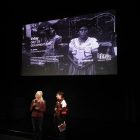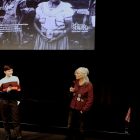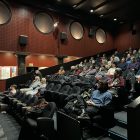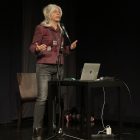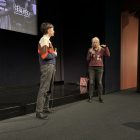D-day: dan za dokumentarec (D-day: The Documentary Day)
Lecture by Alexandra Halkin and screening of videos from the Chiapas Media Project/ProMedios archive
Thursday, 11 January 2024, 5pm and 7pm
Slovenian Cinematheque, Miklošičeva 28, Ljubljana
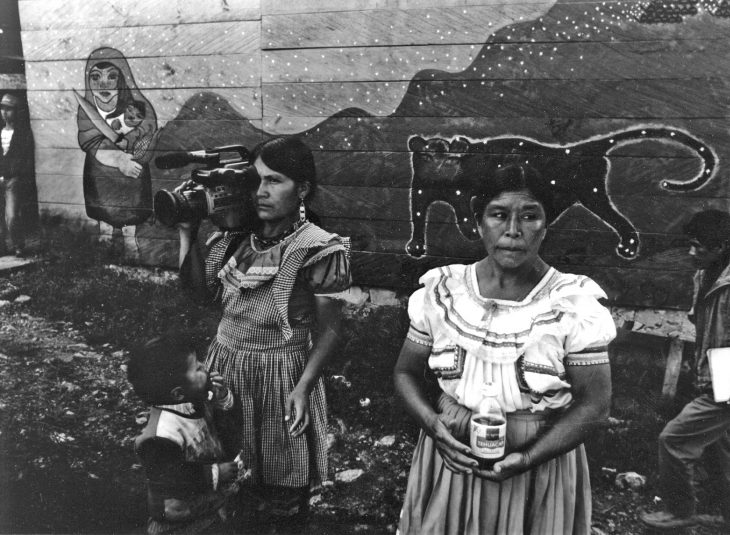
In cooperation with Slovenian Cinematheque, SCCA-Ljubljana is hosting Alexandra Halkin, a director, producer, film curator and writer from Chicago, USA. In her lecture, she will present her work and the beginnings of cooperation with Zapatista communities, as well as the creation of the bi-national cooperation Chiapas Media Project/ProMedios (Mexico/USA), which she founded in 1998 in cooperation with the local community. The organization established indigenous community media centers where the communities produced their own videos that documented community life and the impact of militarization, human rights abuses, cultural and religious events, cooperatives and women’s work, some productions were in their own languages. She will also present the establishment of the Center for the Preservation of Community Audiovisual Archives (CEPAAC) in Chiapas and the current work on the feature film about the Chiapas Media Project/ProMedios archive If we film it, it’s the truth, as well as her many years of work in Cuba supporting community media projects and independent filmmakers under the auspices of the Americas Media Initiative, of which she is the founder. The lecture will be followed by a screening of a video programme from the Chiapas Media Project/ProMedios archive together with two animated films, which she created in collaboration with a group of Cuban animators and musicians during the pandemic.
PROGRAMME
Alexandra Halkin — Collaborations Across Geographies: Mexico and Cuba
Lecture
Thursday, 11 January 2023, 5pm, Slovenian Cinematheque
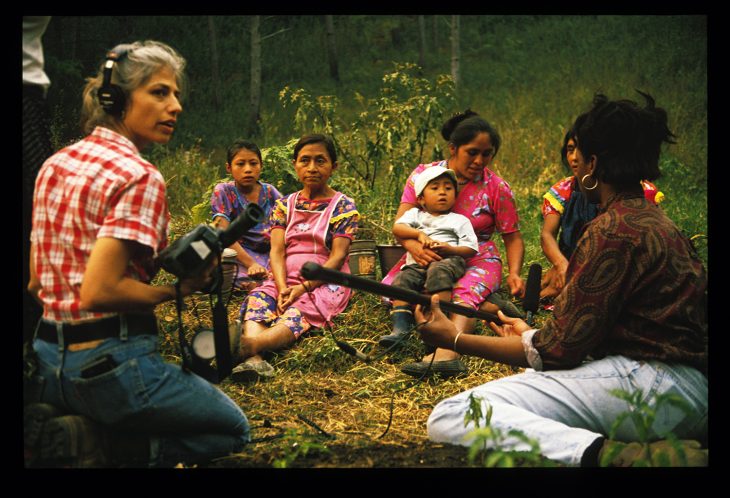
»In the lecture I will provide a bit of background on myself, my career trajectory and how I became involved in working in Chiapas with the Zapatista communities. I will cover how we create a bi-national collaboration that set up media centers with the communities where they produced their own videos as well as the international distribution network we created that helped to sustain the project for the first 10 years. Our path to setting up the Center for the Preservation of Community Audiovisual Archives (CEPAAC) in Chiapas and our current work on our feature, IF WE FILM IT, IT’S THE TRUTH. I will end with my work in Cuba and its most recent iteration that began in 2010 with Americas Media Initiative.« – Alexandra Halkin
Lecture will be held in English language.
Free tickets will be available one hour before the start of the event at the box office of the Slovenian Cinematheque.
_______________
Collective Actions and Pandemic Collaborations: 1998–2021
Screening
Thursday, 11 January 2023, 7pm, Slovenian Cinematheque
Curator: Alexandra Halkin
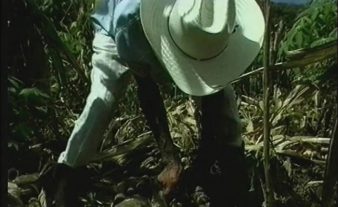
Mexico, 1998, digital format, colour, 14′ 30”, Spanish with English subtitles
A collaboration between indigenous and non-indigenous filmmakers about the drought of 1998 in Chiapas. Chiapas 1998: The Bad Harvest, is a collaboration between indigenous and non-indigenous videomakers which documents severe food shortages in 1998. A six month drought followed by heavy rains and flooding destroyed 50% of the corn crops and 80% of the bean crops. This natural disaster, combined with the constant harassment of 50,000 troops and coupled with extreme poverty and marginalization, left the communities with few options.
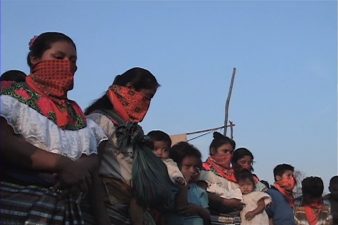
Mexico, 2005, digital format, colour, 15′, English subtitles
The Land Belongs to Those who Work it documents the situation in the town of Bolon Aja’aw, located in the north of Chiapas near the famous Agua Azul river system. The federal government sold the land in Bolon aja’aw to a private company to create an eco-tourism center without the permission of the community members. The video shows a meeting between Zapatista authorities and Mexican Government bureaucrats, and offers a critical look at the practical implications of eco-tourism.
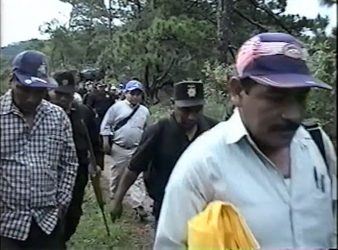
Mexicoa, 2004, digitaln format, 35′, Me phaa & Spanish with English subtitles
Inez and Valentina, two indigenous women from the montaña region of Guerrero were raped by Mexican soldiers. Eyes on What’s Inside looks at the economic, social and political factors that lead to these rapes. The Organization of Indigenous People Me phaa (OIPM) share their story but it is really the story of many indigenous communities in Guerrero. Discussed is the destabilizing effects of the military presence on indigenous communities and how the increasing poverty/marginalization of the population has contributed to the formation of armed guerilla groups, and the presence of narco trafficking. The Mexican Constitution lays out the internal role of the military and Guerrero presents a clear example of how the military acts outside of it’s constitutional mandate.
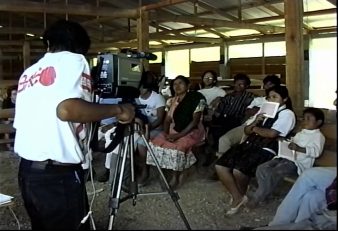
Mexico/USA, 2023, digital format, 9′ 51”, Spanish with English subtitles
»Incorporates various clips from our video archive in Chiapas and new footage with potential characters in our documentary.« – Alexandra Halkin
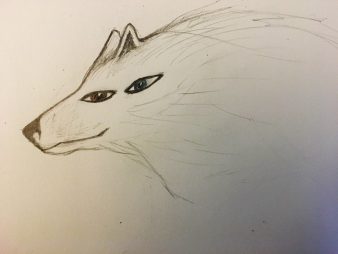
Cuba/USA, 2020, digitaln format, colour, 2′ 54”, Spanish and English
A pandemic fueled animation based on a dream about a four eyed dog.
»Ojos/Eyes is an animation based on a dream I had at the beginning of the pandemic about a four eyed dog. Cuban animator, Ivette Avila created a claymation animation based on my dream and I provided the voice over narration. There are various other Cuban artists and musicians who also collaborated on the animation.« – Alexandra Halkin
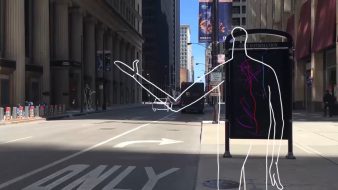
Cuba/USA, 2021, digital format, 6′ 33”, bd
Animation collaboration between filmmakers in Chicago and Havana living in a pandemic altered world.
»Once Upon a Time in Chicago/Erase una vez en Chicago was another animation collaboration I did with a group of Cuban animators and musicians during the pandemic. I filmed the majority of the video when the City of Chicago was in lock down, early in 2020 and Cuba based animator Ramiro Zardoya drew over the footage.« – Alexandra Halkin
Screening in the presence of Alexandra Halkin, Director of the Americas Media Initiative.
Tickets will be available one hour before the start of the event at the box office of the Slovenian Cinematheque.
 Alexandra Halkin founded the Chiapas Media Project/ProMedios in 1998, an award winning bi-national organization that trained over 200 Indigenous men and women in video production in Chiapas and Guerrero, Mexico. Alexandra has consulted with various organizations such as Witness, and CLACPI (Latin American Coordinator for Indigenous Film and Communication). In 2004, Alexandra was awarded a Guggenheim Fellowship for the Latin American Indigenous Video Initiative (LAIVI). In 2007, Alexandra was awarded a Fulbright Scholarship for the Indigenous Audiovisual Archive (IAA) in Oaxaca, Mexico. During this time she also produced five short documentaries in collaboration with Mexican human rights organizations – some winning international awards. In 2010, Alexandra founded the Americas Media Initiative (AMI) a non-profit organization that works with Cuban filmmakers living in Cuba. For the last five years, Alexandra has collaborated with colleagues at ProMedios to create the Center for the Preservation of Community Audiovisual Archives (CEPAAC) based in San Cristobal de las Casas, Chiapas. (Photo: Francisco Vazquez)
Alexandra Halkin founded the Chiapas Media Project/ProMedios in 1998, an award winning bi-national organization that trained over 200 Indigenous men and women in video production in Chiapas and Guerrero, Mexico. Alexandra has consulted with various organizations such as Witness, and CLACPI (Latin American Coordinator for Indigenous Film and Communication). In 2004, Alexandra was awarded a Guggenheim Fellowship for the Latin American Indigenous Video Initiative (LAIVI). In 2007, Alexandra was awarded a Fulbright Scholarship for the Indigenous Audiovisual Archive (IAA) in Oaxaca, Mexico. During this time she also produced five short documentaries in collaboration with Mexican human rights organizations – some winning international awards. In 2010, Alexandra founded the Americas Media Initiative (AMI) a non-profit organization that works with Cuban filmmakers living in Cuba. For the last five years, Alexandra has collaborated with colleagues at ProMedios to create the Center for the Preservation of Community Audiovisual Archives (CEPAAC) based in San Cristobal de las Casas, Chiapas. (Photo: Francisco Vazquez)
Photo: SCCA-Ljubljana archive
Production: SCCA-Ljubljana/DIVA Station, Slovenian Cinematheque and Americas Media Initiative
Supported by: Ministry of Culture of the Republic of Slovenia and City of Ljubljana – Department for Culture
![]()
![]()
![]()
![]()
![]()
![]()

